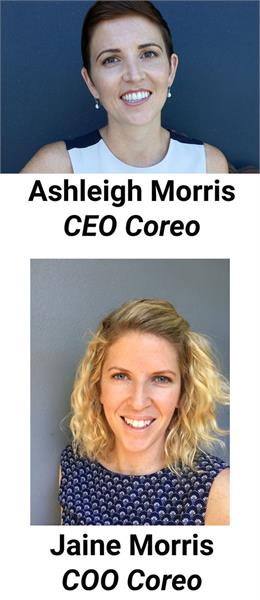Coreo is relied on by governments, corporations and communities to unlock the economic, social, and environmental opportunities of a circular economy through a values-driven approach to action. The company is based in Brisbane, Australia.
InTouch:
What usually motivates your clients to switch to a circular economy? Coreo:
Coreo: Motivation can start from the advocacy of an enthusiastic individual, not always in a leadership position, who has a desire to do things differently. Or, it can be the pain of losing market-share or lacking a brand position associated with doing good. Sometimes an opportunity arises to step into the circular economy space as a workstream. Change always begins with education about wider needs than those of the organisation. Senior team can also be inspired by global trends in circular economy practices.
IT: Is Australian circular economy activity focused in any one industry? Coreo: No, the interest is diverse. The Queensland State Government’s Circular Economy Lab (a formal platform for exploring circular solutions) is made up of 27 entities, from multi-nationals to start-ups. Participants are from agriculture, corporate, resources, telecommunications, IT and social enterprises. Leadership in circular economies is coming from the fashion sector, with a lot of solutions contributed by the textile industry.
IT: Which countries lead in circular economy practices? Coreo: China has had circular economics embedded for at least 10 years. The leading countries are there because of their governments’ activities, coupled with deliberate action on procurement, in industrial park design and in manufacturing. There is also strong leadership from Europe. Australia is doing a lot of great work in agriculture, textiles, materials and the waste sector. We are ‘on the map’, but not with concerted or consistent policy as a nation.
IT: What needs to happen for Australia to more widely embrace the circular economy? Coreo: Procurement policy needs to change in government processes. Government choices and actions significantly influence industry sectors. The global narrative is one of governments setting the agenda. The step after that is to shift the economic system from taxing people to taxing companies – and materials. Now, we have subsidies for materials and commodities, including harmful ones, with individuals funding those subsidies through income taxes.
IT: How have Coreo projects led to spin-offs for clients or communities? Coreo: Our work is often the catalyst for bigger internal or external projects, with participants sharing ongoing economic and educational benefits. One circular experiment usually leads to collective action on setting bigger objectives. This happened for two of our major clients, Lend Lease and Brisbane Airport. The airport’s original circular economy project has since scaled out to establish a precinct-wide target of 85 per cent diversion of general waste from landfill, and a separate food waste diversion target of 95 per cent. As well, 14 new manufacturing jobs and jobs for disadvantaged job seekers were created for the precinct, which comprises 400 small businesses in the largest footprint of any airport in Australia.
IT: Was there a breakthrough moment for Coreo, in establishing its success? Coreo: Our success is underpinned by value-driven operations. We promote investment in people and in connecting with the individual – human beings who care about a better tomorrow. Staying true to organisational values has resonated for organisations choosing a circular economy.
IT: What common resistance is there to a shared resource system? Coreo: The big one is the shift from ‘I’ to ‘we’ when working on value with supply chains. The circular economy requires multiple inputs to come together for mutual economic benefit. Clients can be uncomfortable with this at first. We ask them to compete where they must and collaborate where they can. Collaboration means sharing profits and problems, but there is a lot of value in doing so and Coreo has been able to demonstrate that.
IT: Are any unexpected influences motivating the switch to a circular economy? Coreo: Yes, we were surprised at the huge social aspect within corporations, of people feeling pride in what they do. The social engagement side can be internal or external. The social good is a major motivator and probably the biggest of the three forces behind the circular economy, with the other motivators for transformation being economic and environmental. Coreo has found that people want to feel good first. They want to take pride in their employer and their jobs. People want to contribute to the social fabric through their work.
IT: What is a common misunderstanding about the circular economy?Coreo: That it’s only about better recycling of waste or only about sustainability in those terms, when it’s about economics. Waste reduction is the common entry point, and it has a part to play, but people get stuck there. The principle of a circular economy is to design waste and pollution out of the system. Waste is the entry point, but it’s a stepping-stone to real opportunity, which is the shared economy.
IT: What’s the next milestone for Coreo? Coreo: We hope to take on a large and multi-scaled circular economy project to transform an entire region, based on social, environmental and direct economic needs. Such a project would be underpinned by a financial model new to Australia and containing mechanisms to empower people who have a stake in the future who don’t typically have a driver’s seat position in leading change.
IT: What keeps you inspired? Coreo: We’re inspired by making a difference and inspiring our clients. We believe in transformation over transaction and want to transform entire organisations and government bodies. Working with individuals who also believe in a better future is always energising. Celebrating the wins from hard work with motivated teams keeps us going.
At
IPWC 2019 Ashleigh and Jaine Morris will share the story of Coreo’s humble beginnings and how their work demonstrating the value of a circular economy has been a catalyst towards transition in Australia.